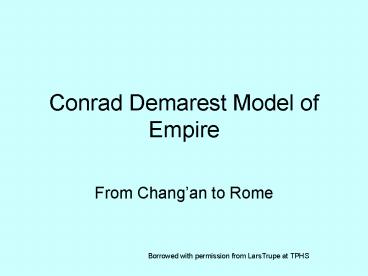Conrad Demarest Model of Empire - PowerPoint PPT Presentation
1 / 7
Title:
Conrad Demarest Model of Empire
Description:
Borrowed with permission from LarsTrupe at TPHS ... High agricultural potential in the area. An environmental mosaic ... militaristic Legalism developed by Qin ... – PowerPoint PPT presentation
Number of Views:1565
Avg rating:3.0/5.0
Title: Conrad Demarest Model of Empire
1
Conrad Demarest Model of Empire
- From Changan to Rome
- Borrowed with permission from LarsTrupe at TPHS
2
I. Necessary preconditions for the rise of empires
Roman Empire
Han China
- republic
- kept most of Qin centralised government in place
High agricultural potential in the area
- wheat, grapes, cattle
- wheat, millet, pigs
An environmental mosaic
- Alps, Mediterranean Sea, forests, Tiber and other
rivers, hills
- Tianshan mountains, Huang He Chang Jiang river,
loess soil, Pacific Ocean
Several small states with no clearly dominant
state (power vacuum)
- Rome and other city-states on Italian peninsula
surrounding states in Mediterranean (Greek
states, Egypt, Judea, Syria, Cyprus, Gaul,
Romania, Spain, Sicily, Sardinia, Carthage, etc.
- Qin empire broken into smaller states
3
I. Necessary preconditions for the rise of empires
Roman Empire
Han China
Mutual antagonisms among those states
- rivalry between pastoralists in hills and
agriculturalists in plains
- Warring States period before Qin unification
Adequate military resources
soldiers first recruited only from peasant class
on Italian peninsula population inexhaustible
- soldiers recruited from peasant class within the
entire empire population inexhaustible
4
II. The primary reason a state succeeded in
empire building was an ideology supporting
personal identification with the state, empire,
conquest, militarism
Roman Empire
Han China
- "republic" based on citizenship of free men
- citizenship ensured loyalty to state and
brought taxes into the state treasury - emperor-dictators had to support the idea of the
republic pretend to follow what the Senate,
council of elder wealthy men, decreed. - bureaucracy helped run empire.
- militaristic Legalism developed by Qin
- softened by Confucian system of government based
on ethics, meritocracy, - concept of the Mandate of Heaven.
- bureaucracy helped run empire.
- Tribute system for foreign relations
5
III. The rewards of the empire economic
rewards, reaped especially in the early years and
redistributed to the elite and often to all levels
Roman Empire
Han China
- citizenship led to recognition of place in
society, - possible government and military positions of
leadership, - opportunities for merchants,
- Roman-style urbanism for new towns and cities
- land for supporters,
- expansion of established cities,
- creation of new capital,
- storehouses of food when supplies fell
Population increase, often supported by the
government and its ideology
- population increased as new land was colonized by
Chinese farmers
- population increased as new lands with more
people were conquered
6
IV. Empires fall because the ideology of
expansion and conquest fueled attempts at
conquest beyond practical limits
Roman Empire
Han China
- military service became less desirable as
soldiers lost land - recruits of "foreigners" to keep numbers of
soldiers up led to dissatisfaction - tax revenues fell, so government failed to pay
soldiers fully - safety within empire and on borders declined
- "barbarians" continued to demand more concessions
in the tribute system - recruits of "foreigners" to keep numbers of
soldiers up led to dissatisfaction - tax revenues fell, so government failed to pay
soldiers fully - safety within empire and on borders declined
7
IV. Empires fall because the ideology of
expansion and conquest fueled attempts at
conquest beyond practical limits
Roman Empire
Han China
Failure to continue conquest indefinitely and to
continue to bring home its economic fruits eroded
faith in the ideology that supported the empire
- tenant farmers looked to landowners of
latifundias for security - soldiers' loyalty shifted to generals and
officers rather than the state .
- tenant farmers looked to landowners for security
- bandits and rebels attacked government officials
and facilities
Revolutions
- Germanic tribes sacked cities near borders and
finally Rome
- Yellow Turbans peasant rebellion































